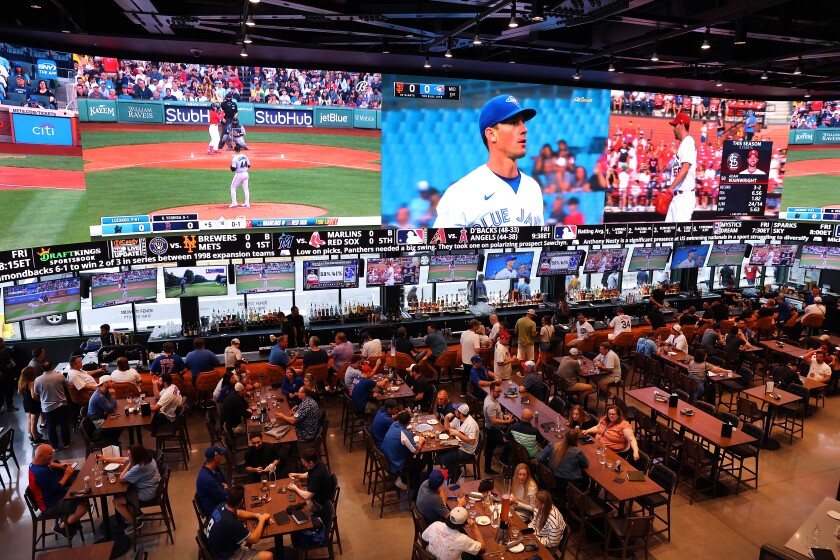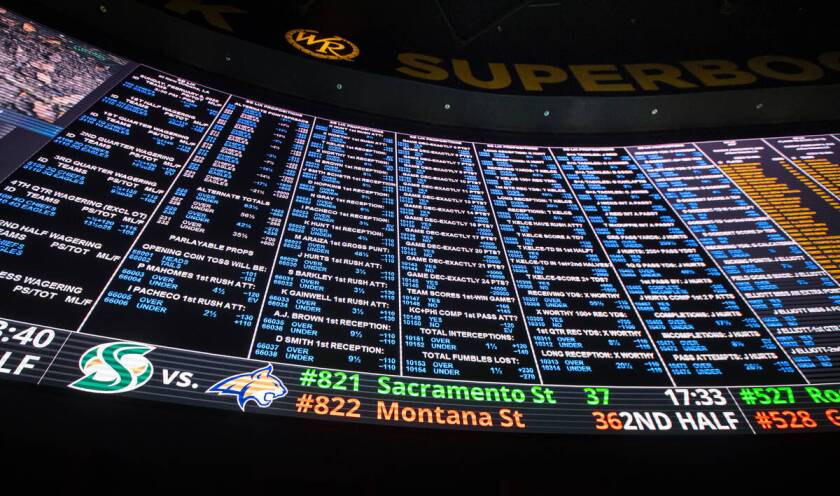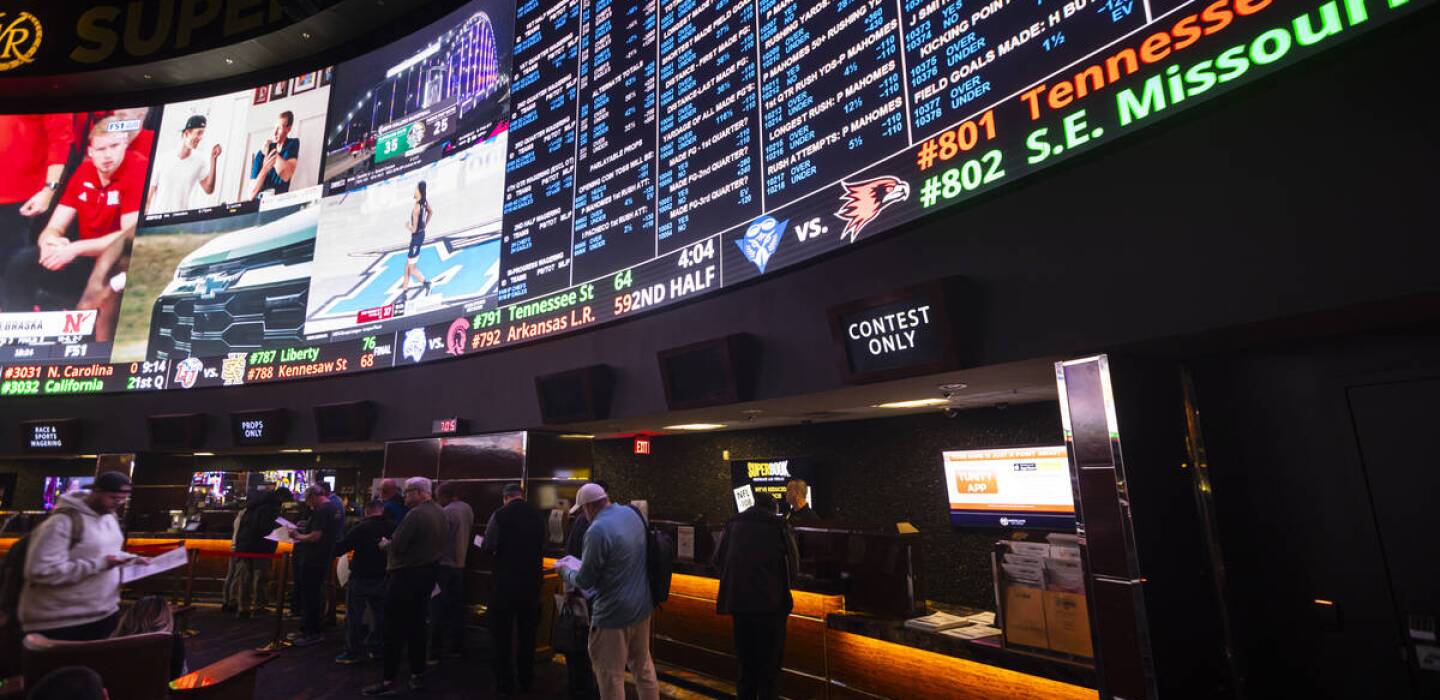For Kansas state Rep. Francis Awerkamp, the only thing that has gone right with the state’s sports betting program is that people are allowed to do it.
Awerkamp, a Republican, has been a vocal supporter of changing the relatively new program in Kansas.
Despite more than $6 billion in wagers placed since legalization in 2022, Kansas has brought in only about $17 million in tax revenue — less than 1 percent of those wagers. That’s because at 6.5 percent, Kansas’ tax on sports wagering ranks among the lowest in the country, trailing only Arizona and Michigan. The rate was originally set at 10 percent, but a legislative loophole permitting operators to write off promotional credits and certain expenses has effectively cut the state’s share of taxable revenue.
Awerkamp argues that Kansas rushed to legalize its sports betting program without taking care to ensure it would generate meaningful revenue. He says the bill was primarily written by the casinos and gaming industry, for their own benefit.
“The state constitution clearly shows that the intention of the lottery is to bring revenue to the state for the benefit of the taxpayers. The current structure fails in this regard miserably,” Awerkamp wrote to Governing in an email. “We work for the people of Kansas, not those who wish to use the government to create a special monopoly.”
Kansas’ situation isn’t unique. Other states are also having doubts about whether their sports betting programs — legalized in a rush of legislation over the last several years — are generating the promised benefits. The country has seen an uptick in problematic gambling behaviors, especially among young men, and government coffers aren’t always receiving the expected padding.
‘We’re in the Wild West’
Once relegated to Las Vegas and parts of New Jersey — or illegal bookie halls resembling something out of a Scorsese movie — the Supreme Court changed the gambling field overnight by giving states the option to legalize sports betting programs. Suddenly, millions of Americans had a casino on their phones.
Delaware, New Jersey, Mississippi and West Virginia were the first states to launch their programs shortly after the ruling, demonstrating that, despite an increasing cultural divide between red and blue states, betting on sports is a bipartisan hobby.
But that may be changing. According to the Pew Research Center, public sentiment toward sports betting sours with each passing year. In an October report, 43 percent of U.S. adults stated that the legalization of sports betting in much of the country is detrimental to society. That’s an increase from 34 percent in 2022. Additionally, 40 percent of adults now say it’s bad for sports, up from 33 percent.
Currently, 38 states (plus Washington, D.C., and Puerto Rico) offer some form of legal sports betting. Of the 38, 32 states allow online and mobile betting options for gambling.
Before the SCOTUS decision, “gambling was happening regardless and was seedy and illegal. Now it’s legal and there is at least some revenue being generated for the states,” said Stephen Shapiro, a University of South Carolina professor who researches sports gambling.
However, Shapiro argues that sports betting programs have been established too fast for state lawmakers to keep up. Gaming giants like FanDuel and DraftKings can rapidly launch betting products, update apps frequently and adapt promotions based on user data. In contrast, state governments regulate through legislative cycles, involving public comment, review and political negotiations.
“That job [of catching those two things up] will happen over time, but we’re in the wild west right now,” Shapiro says.
And while these programs are relatively new, they’ve been plagued by scandals and corruption.
At the heart of most of the industry’s explosive growth are microbets and parlays. A microbet allows fans to wager on a single moment in a game: the next pitch, the next play or the next free throw. Parlays, on the other hand, combine multiple wagers into one, promising big payouts if every leg hits. Both formats amplify engagement and adrenaline, turning a single game into hundreds of betting opportunities.
In most states that publish relevant data, parlays account for between half and two-thirds of the sports operators’ revenue, according to data from The Washington Post.

(Chris Sweda/TNS)
The risks of these microbets and parlays came into sharp focus this fall, when federal investigators charged several individuals, including a Miami Heat player and head coach of the Portland Trail Blazers, in a betting and insider-information scheme that prosecutors say was linked to organized crime. Authorities allege that players shared details about injuries and in-game decisions that associates used to place targeted microbets.
The case underscored what some have warned from the outset: as betting becomes faster and more granular, it also becomes more vulnerable — not just to problem gambling, but to corruption that can erode public trust in both sports and the states that profit from betting.
However, the American Gaming Association, the industry group representing gaming operators, said in a statement that the indictments are “a stark reminder of the pervasive and predatory illegal market,” and argued that “the regulated legal market delivers transparency, oversight, and collaboration with authorities that assists in bringing these bad actors to light.”
The Promise of a Payout
Not all state headlines about sports betting programs have been negative. Just across the state line from Kansas in Colorado, state regulators are promoting their sports betting program as a crucial source of funding for water conservation projects throughout the state.
Voters narrowly approved a ballot measure in 2019 that promised that almost all (93 percent) of the revenue generated from the sports betting program would go to the Colorado Water Plan. The plan supports the state by providing funding and technical resources to implement community-approved programs and projects.
Earlier this year, Colorado distributed more than $33 million in sports betting revenue to the Water Plan. The Colorado Department of Revenue reported that this fiscal year’s revenue represents a 354 percent increase in total taxes compared to the first fiscal year of sports betting, with the state collecting more than $100 million since the program began operating.
Christopher Schroder, director of the Colorado Division of Gaming, attributes the state’s success to a flexible approach in an industry that requires it. The state engages in regular conversations with sportsbook operators and updates its responsible gaming programs as new issues arise. The state emphasizes prevention and research and has awarded over $7 million in grants to schools, military bases and treatment providers for initiatives related to problem gambling.
“The gaming landscape is changing every day, and we really want to embrace change. We’re constantly evolving to deliver these products safely,” says Schroder, who was a director of surveillance on the Las Vegas Strip before coming to Colorado. “It’s a problem if we’re inflexible and not adjusting to the market.”

(Chase Stevens/TNS)
However, across the country, another picture is emerging about state revenues from sports betting. Namely, it hasn’t been the windfall some early-adopter states hoped for.
“When you look at the revenues raised, it really has been a drop in the bucket compared to other state programs,” said Andrea Jimenez, fiscal policy analyst at the National Conference of State Legislatures. “It hasn’t really been this big revenue generator that people thought initially that it might be.”
For example, Arizona was projected to generate $100 million annually after gambling legalization in April 2021, but actual revenue was only around $26 million in 2021 and $34 million in 2023.
However, in the wake of dwindling financial support from the federal government — particularly in states run by opponents of President Donald Trump — some officials believe it’s necessary to explore any possible additional revenue sources.
“A pool of money in front of legislators can become very tempting for setting tax rates,” says Al Williams, a Georgia state representative and president-elect of the National Council of Legislators from Gaming States (NCLGS), a non-partisan organization focused on proper industry regulation in states where sports betting is legal. “If it’s carefully structured, it can create meaningful economic development,” Williams says.
The Social Costs of an Easy Bet
There is no denying that problem gambling has begun rapidly increasing in the intervening years since the 2018 SCOTUS decision.
Uttara Ananthakrishnan, a University of Washington professor studying tech platforms and social behavior, has a personal connection to gambling. She says she comes from “a long line of gamblers” and observes that, although less common than other addictions, gambling causes “a lot of intergenerational trauma” and can destabilize families over generations.
As policymakers review the effectiveness of their programs, Ananthakrishnan hopes they’ll prioritize funding for initiatives aimed at reducing problem gambling.
She explains that, in the past, people had to physically go to a gas station to buy a lottery ticket, but today they can carry a virtual casino in their pocket. States interested in curtailing problem gambling should consider creating more “friction” in the process — such as restricting betting to specific locations or outlawing parlays.
These moves have been harshly criticized by the gaming industry, with the American Gaming Association arguing that these policies would only lead to bettors turning to illegal, unregulated gambling operations.
Experts also argue that states must rein in misleading marketing if they haven’t already, especially the ubiquitous “free bet” offers that hook new users with false promises. Those promotions, loaded with fine print, are “not free at all,” Shapiro says. “They’re designed to keep you playing.” If a state hasn’t already, regulating advertising in the same manner as states regulate alcohol or tobacco — with clear disclosures and age-focused limits — would be a meaningful first step to curb problem gambling. Ohio, Massachusetts and Colorado have cracked down on the terms “free bet” or “risk-free wager,” and New York mandates warning messages about gambling’s harmful effects in all ads.
None of these changes turn gambling into a harmless pastime. However, experts say it’s possible for sports betting to resemble other risky behaviors we tolerate, such as drinking, smoking or even taking out a high-interest loan. The goal doesn’t have to be purity, but rather consumer guardrails.
Ananthakrishnan highlights the shift in the culture around smoking cigarettes. Gradually, through warnings, limits on advertising, and, yes, high taxes, smoking rates are now at an 80-year low, according to Gallup. Betting, she says, may require the same long view.
And ultimately, even the lawmakers closest to the issue acknowledge a hard truth: States can reduce harm, but they can’t legislate desire.
“Every man should have the right to go to hell if he wants to,” NCLGS’ Williams said.
